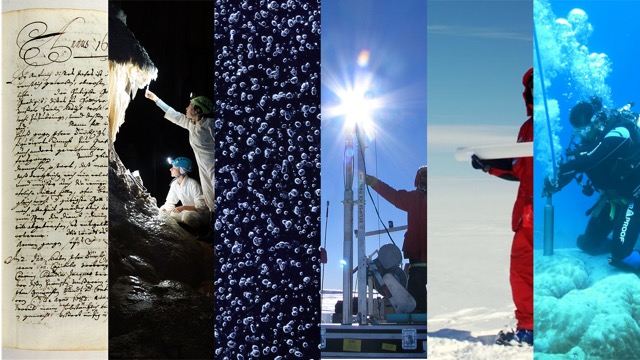Future Earth Members to Speak at Past Global Changes Symposium
International Symposium on Past Global Changes: Lessons for a Sustainable Future 2023

The Past Global Changes (PAGES) project will be hosting a one-day science symposium at the University of Bern, Switzerland, on 1 June 2023, to showcase the broad and diverse scientific achievements of PAGES working groups. Working groups and their research form the backbone of the PAGES project. This research aims to understand the Earth’s past environment in order to obtain better predictions of future climate and environment, and inform strategies for sustainability. Throughout the day, working groups will present their latest research in paleoscience
and how it is relevant to our understanding of present-day environmental and climate science, and policy.
Speakers from Future Earth include:
Carolina Adler from Mountain Research Initiative (MRI)
Cornelia Krug, bioDISCOVERY
Davnah Urbach from Global Mountain Biodiversity Assessment (GMBA)
What is paleoscience?
Paleoscience is the study of the Earth’s System dynamics, climate and environmental variability and change over timescales ranging from hundreds to millions of years.
How is paleoscience relevant to present day problems?
Paleoscience allows us to understand how much humans have changed the world in which we live, helping us to separate what is natural variability and change from what is man-made, and providing an historical/pre-historical perspective to current problems such as flooding, fire, deforestation, biodiversity, volcanic eruptions, erosion, sea-level rise and climate change. This knowledge also provides a way for us to better understand the Earth system outside of our modern experience, so that we are better able to make predictions about changes to the Earth system and all related essential ecosystem services in the future. This includes the evaluation and improvement of climate models on which we depend to project our future climate and environment.
What are some examples of this?
For over 70 years scientists have been measuring the growing concentration of CO2 in our atmosphere, but how do we know that these concentrations of this potent greenhouse gas are unusual in the context of recent history of the planet of the past million years? The answer has come from paleoscience, and the discovery of long-term records of CO2 held in the polar ice sheets, which show that modern levels of CO2 in the atmosphere are greater now than they have ever been in at least the last 800 thousand years. Similarly, paleoscience has also allowed us to extend our knowledge of the temperature of the Earth back thousands of years before the invention of the thermometer through the analysis of tree-rings and other climate proxies. This evidence shows that the warming we have experienced in the last 150 years is unprecedented in at least the last 2000 years.
Towards a sustainable future Earth
Paleoscience provides society with a critical perspective with which to assess the seriousness of modern environmental and climatic problems, allowing us to differentiate between what is natural and what is man-made, and therefore the impact of humans on Earth. Studying past climate and environmental changes through paleoscience also allows us to better understand the Earth system, and subsequently to develop, evaluate and improve models on which we rely to forecast our future. This provides a firm scientific foundation for society to develop practical policies and strategies to allow us to live in the future in a sustainable way that will not adversely affect future generations.
What is PAGES?
PAGES is a global network of scientists dedicated to supporting and facilitating paleoscience research through coordination and knowledge sharing. PAGES receives financial support from the Swiss Academy of Sciences (SCNAT) and the Chinese Academy of Sciences (CAS), and is supported in-kind by the University of Bern, Switzerland, and is part of the university’s Oeschger Centre for Climate Change Research (OCCR).
PAGES working groups are smaller sub-networks of paleoscientists within PAGES dedicated to a specific topical research issue.
Media enquiries: Leigh Martens Winiger | leigh.martens@unibe.ch
DATE
May 25, 2023AUTHOR
Future Earth Staff MemberSHARE WITH YOUR NETWORK
RELATED POSTS
Reflections from the Fire Science Learning AcRoss the Earth System (FLARE) Workshop
Future Earth Networks Organize Workshop on Impacts of Increased Wildfires on the Ocean and Other Earth Systems
What Antarctic Sea-Ice Patterns Over the Past 130,000 Years Tell Us About Future Climate Transitions